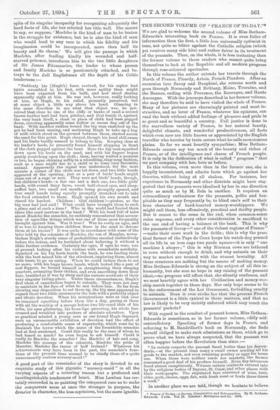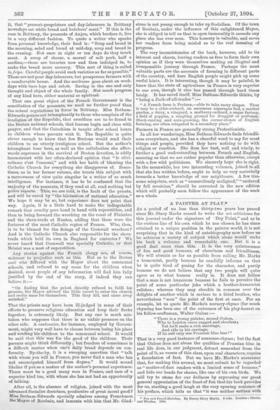THE SECOND VOLUME OF "FRANCE OF TODAY."* WE are glad
to welcome the second volume of Miss Betham- Edwards's interesting book on France. It is even fuller of information than the first, a little less universally optimist in tone, not quite so bitter against the Catholic religion (which yet receives many side hits) and rather fairer in its treatment of the peasants. Thus, on the whole, it is less irritating than the former volume to those readers who cannot quite bring themselves to look at the Republic and all modern progress through rose-coloured spectacles.
In this volume the author extends her travels through the North of France, Picardy, Artois, French Flanders. After an excursion into Savoy and Dauphin, she returns north and goes through Normandy and Brittany, Maine, Touraine, and the Beance, ending with Provence, the Rouergue, and Haute Auvergne. With the journeys described in her former volume, she may therefore be said to have visited the whole of France. Many of her pictures are charmingly painted and most in- structive, and no lover of France, whatever his opinions, can read the book without added feelings of pleasure and pride in so great and so beautiful a country, Fall justice is done to the marvellous variety of France, to her natural beauty, delightful climate, and wonderful productiveness, all facts which even now are little known or appreciated by the English traveller who hurries by train across what he calls monotonous plains. So far we most heartily sympathise; Miss Betham. Edwards cannot say too much of the beauty and riches of France, or of the intelligence and charm of French people. It is only in the deification of what is called " progress " that we part company with her, here as before.
In this volume, even more than in the former one, she is happily inconsistent, and admits facts which go against her theories, without being at all shaken. For instance, her experience in Normandy and other districts might have sug- gested that the peasants were idealised by her in one direction quite as much as by M. Zola in another. It requires an extraordinary enthusiasm for the peasants, polite and hos- pitable as they may frequently be, to blind one's self to their true character of hard-hearted money-worshippers. We might call them, less offensively, practical and thrifty people.
But it comes to the same in the end, when common-sense rules supreme, and every other consideration is sacrificed to the one end of having a balance at the bank. This is why the peasants of Savoy—" one of the richest regions of France" —make their cows work in the fields ; this is why the prac- tical farmer of the Pays de Caux keeps his watch-dog penned all its life in an iron cage two yards square—it is only " une machine aboyer ; " this is why Norman cows are tethered in rows without enough to drink, and why animals on their way to market are treated with the utmost brutality. All these creatures are nothing but the means of making money. Miss Betham-Edwards is strong on the subject of all this in- humanity, but she sees no hope in any raising of the peasant ideal,—no progress will affect that, she silently confesses, and we most heartily agree with her Civilisation and money-wor-
ship march together in these days. Her only hope seems to lie
in the enforcement of the Loi Grammont, forbidding cruelty to animals. Does it ever strike her that the present French Government is a little cynical in these matters, and that no law is likely to be very strictly enforced which may touch the peasants' pockets P With regard to the comfort of peasant homes, Miss Betham. Edwards is sometimes, as in her former volume, oddly self- contradictory. Speaking of former days in France, and referring to M. Baudrillart's book on Normandy, she finds herself obliged to make such admissions as these, which go to prove what we have always suspected, that the peasant was often happier before the Revolution than since :— " In certain respects the peasant fared better than his descen- dants,—at the present time many a small owner sending all his goods to the market, not even retaining poultry or eggs for home use. When there were neither roads nor markets, the farmer consumed a good deal of his produce himself. Even day-labourers fared almost sumptuously. Witness certain contracts entered into by the religious bodies of Bayeux, St. Omer, and other places with their work-people. The stipulated fare consisted of wine, beer, cider, pork, cheese, eggs, fish, with fresh meat or fowls three times a week."
In another place we are told, though we hesitate to believe • France of To-day a Survey, Oomparative and Retroepective. By M. Bvtliame Edwards. 2 vole. Vol. IL London : Rivington and Co. 1224.
it, that "peasant-proprietors and day-labourers in Brittany nowadays eat white bread and butchers' meat." If this is the case in Brittany, the peasants of Anjou, which borders it, live in a very different fashion. To quote a writer who speaks from personal knowledge, their food is "Soup and bread in the morning, salad and bread at mid-day, soup and bread in the evening. Not once in eight or ten days do they touch meat. A scrap of cheese, a morsel of salt pork, half a sardine,—these are luxuries now and then indulged in, to make the bread more savoury. This sort of thing is called la fripe. Careful people avoid such varieties as far as possible." These are not poor day-labourers, but prosperous farmers with a comfortable house. And the maitresse goes about on week- days with bare legs and sabots. Saving is the one and only thought and object of the whole family. Not much progress of any kind here, either material or spiritual.
That one great object of the French Government is the conciliation of the peasants, we need no further proof than the school regulations in force in Brittany. Miss Betham- Edwards points out triumphantly to those who complain of the irreligion of the Republic, that crucifixes are to be found in the Breton national schools, that lessons begin and close with prayer, and that the Catechism is taught after school hours to children whose parents wish it. The Republic is quite clever enough to know that few Bretons would send their children to an utterly irreligious school. But the author's triumphant tone here, as well as the satisfaction she after- wards expresses in the survival of Breton devotion, is oddly inconsistent with her often-declared opinion that "le Obi- calisme &est l'ennemi," and with her habit of blaming the Catholic Church for everything she disapproves of. Some- times, as in her former volume, she treats this subject with a narrowness of view quite singular in a writer of so much intelligence. For instance, it has to be confessed that the majority of the peasants, if they read at all, read nothing but police reports. This, we are told, is the fault of the priests, and will be cured by " the laicisation of national education." We hope it may be so, but experience does not point that way, Again, it is a little hard to make the indisputable remark that cruelty goes hand in band with superstition, and then to bring forward the wrecking on the coast of Finistere and the slave-trade at Nantes, adding that these were the features of the most Catholic region of France. Who, then, is to be blamed for the doings of the Cornwall wreckers ? And is the Catholic Church also responsible for the slave.
trade which held its own in England for centuries ? We never heard that Cornwall was specially Catholic, or that Bristol was a nest of superstition.
Any stories against the French clergy are, of course, welcome to prejudice such as this. But as to the Breton eurii who differed with the Mayor about the communal
schools, and refused to say mass for the children when desired, most people of any information will find him fully justified by the end of the story, if indeed they can believe it :— "On finding that the priest directly refused to fulfil his promise, the Mayor advised the little crowd to enter the church and recite mass for themselves. This they did, and came away satisfied."
That the priests may have been ill-judged in some of their efforts to preserve religious education and keep their flocks together, is extremely likely. But any one is much mis- taken who supposes that there is no -unfair pressure on the other side. A cantonnier, for instance, employed by Govern-
ment, might very well have to choose between losing his place and sending his children to the communal school. It would be said that this was for the good of the children. Their parents might think differently ; but freedom of conscience is a difficult matter when one's daily bread depends on con- formity. By-the-by, it is a sweeping assertion that "talk with whom you will in France, you never find a man who has not emancipated himself from dogma." It would sound likelier if put as a matter of the author's personal experience. There must be a good many men in France, and men of a superior kind too, with whom she has not had an opportunity of talking.
After all, is the absence of religion, joined with the most advanced Socialist doctrines, productive of great moral good ?
Miss Betham-Edwards specially admires among Frenchmen the Mayor of Roubaix, and laments with him that Mr. Glad- stone is not young enough to take up Socialism. Of the town of Roubaix, under the influence of this enlightened Mayor, she is obliged to tell us that in open immorality it exceeds any place she has ever seen. This honesty is valuable, and saves her readers from being misled as to the real meaning of progress.
The very inconsistencies of the book, however, add to its interest and charm, leaving readers as free to form their own opinion as if they were themselves making an illogical and irresponsible journey through France. Perhaps the most valuable parts are the accounts of farming in different parts of the country, and here English people might pick up some useful hints. It is interesting, though it may be painful, to know that the state of agriculture in France is very superior to our own, though it also has passed through hard times lately. It has saved itself, Miss Betham-Edwards thinks, by "being a Jack-of-all-trades" :—
" A French farm is Protean,—able to take many shapes. Thus it may be a cider-orchard, an enormous asparagus bed, a market garden, a dairy, a vineyard, a mulberry-orchard, a sugar factory, a field of poppies, a simpling ground for druggist or perfumer. Stock-rearing and corn-growing, the corner-stones of English farming, are often relegated to a secondary place."
Farmers in France are generally strong Protectionists.
In all her wanderings, Miss Betham-Edwards finds friendli- ness everywhere, and she has a cheerful word to say for most things and people, provided they have nothing to do with religion or reaction. She does her best, well and wisely, to further a good understanding between French and English, assuring us that we are rather popular than otherwise, except with a few wild politicians. We sincerely hope she is right. In the meanwhile, her two interesting volumes, joined to all that she has written before, ought to help us very materially towards a better knowledge of our neighbours. A few tire- some misprints, such as " unmercilessly maligned," "enslaved by fell musician," should be corrected in the new edition which will probably soon follow the appearance of the work as a whole.







































 Previous page
Previous page